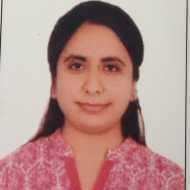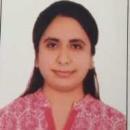
Sushant Lok Phase 3, Gurgaon, India - 122001.
6 yrs of Exp
Details verified of Tanu✕
 Identity
Identity
 Education
Education
Know how UrbanPro verifies Tutor details
Identity is verified based on matching the details uploaded by the Tutor with government databases.
Hindi
English
![]() Narsee Monjee Institute of Management Studies (NMIMS) 2014
Narsee Monjee Institute of Management Studies (NMIMS) 2014
Master of Business Administration (M.B.A.)
Sushant Lok Phase 3, Gurgaon, India - 122001
![]() Phone Verified
Phone Verified
![]() Email Verified
Email Verified
Report this Profile
Is this listing inaccurate or duplicate? Any other problem?
Please tell us about the problem and we will fix it.
Class Location
![]() Online (video chat via skype, google hangout etc)
Online (video chat via skype, google hangout etc)
![]() Student's Home
Student's Home
![]() Tutor's Home
Tutor's Home
Years of Experience in Class 11 Tuition
6
Board
CBSE, ISC/ICSE
Subjects taught
English, Sociology, English Literature, Political Science, Philosophy, Business Studies, History, Psychology, Physical Education
Taught in School or College
No
Class Location
![]() Online (video chat via skype, google hangout etc)
Online (video chat via skype, google hangout etc)
![]() Student's Home
Student's Home
![]() Tutor's Home
Tutor's Home
Years of Experience in Class 12 Tuition
6
Board
CBSE, ISC/ICSE
Subjects taught
Physical Education, Business Studies, Psychology, Political Science, English, Sociology, English Literature, History, Philosophy
Taught in School or College
No
Class Location
![]() Online (video chat via skype, google hangout etc)
Online (video chat via skype, google hangout etc)
![]() Student's Home
Student's Home
![]() Tutor's Home
Tutor's Home
Years of Experience in Class 6 Tuition
6
Board
ICSE, CBSE
Subjects taught
Chemistry, English, Physics, History, EVS, Geography, Computers, Computer Science, Mathematics, Science, Biology, Social science, Hindi
Taught in School or College
No
Class Location
![]() Online (video chat via skype, google hangout etc)
Online (video chat via skype, google hangout etc)
![]() Student's Home
Student's Home
![]() Tutor's Home
Tutor's Home
Years of Experience in Class 7 Tuition
6
Board
ICSE, CBSE
Subjects taught
EVS, Geography, Physics, History, English, Mathematics, Hindi, Science, Computers, Computer Science, Chemistry, Social science, Biology
Taught in School or College
No
Class Location
![]() Online (video chat via skype, google hangout etc)
Online (video chat via skype, google hangout etc)
![]() Student's Home
Student's Home
![]() Tutor's Home
Tutor's Home
Years of Experience in Class 8 Tuition
6
Board
ICSE, CBSE
Subjects taught
Mathematics, Biology, English, Physics, Social science, Science, History, Computers, Geography, EVS, Hindi, Chemistry, Computer Science
Taught in School or College
No
Class Location
![]() Online (video chat via skype, google hangout etc)
Online (video chat via skype, google hangout etc)
![]() Student's Home
Student's Home
![]() Tutor's Home
Tutor's Home
Years of Experience in Class 9 Tuition
6
Board
CBSE, ICSE
Subjects taught
Computer Application, Mathematics, Geography, Chemistry, Social Science, Hindi, EVS, History and Civics, Biology, English Literature, Physical Education, English, Science, Physics
Taught in School or College
No
Class Location
![]() Online (video chat via skype, google hangout etc)
Online (video chat via skype, google hangout etc)
![]() Student's Home
Student's Home
![]() Tutor's Home
Tutor's Home
Years of Experience in Class 10 Tuition
6
Board
CBSE, ICSE
Subjects taught
Biology, Geography, Science, Physical Education, EVS, Physics, Computer Application, History and Civics, Mathematics, Chemistry, Hindi, English, Social Science, English Literature
Taught in School or College
No
Class Location
![]() Online (video chat via skype, google hangout etc)
Online (video chat via skype, google hangout etc)
![]() Student's Home
Student's Home
![]() Tutor's Home
Tutor's Home
Years of Experience in Class I-V Tuition
6
Fees
₹ 150.0 per hour
Board
ICSE, CBSE
Subjects taught
EVS, English, Mathematics, Science, Hindi, Social studies, Computers
Taught in School or College
No
Upcoming Live Classes
1. Which school boards of Class 12 do you teach for?
CBSE, ISC/ICSE
2. Have you ever taught in any School or College?
No
3. Which classes do you teach?
I teach Class 10 Tuition, Class 11 Tuition, Class 12 Tuition, Class 6 Tuition, Class 7 Tuition, Class 8 Tuition, Class 9 Tuition and Class I-V Tuition Classes.
4. Do you provide a demo class?
Yes, I provide a free demo class.
5. How many years of experience do you have?
I have been teaching for 6 years.
Answered on 05/12/2017 Learn CBSE - Class 10/Science
Answered on 05/12/2017 Learn CBSE - Class 9/Mathematics
Class Location
![]() Online (video chat via skype, google hangout etc)
Online (video chat via skype, google hangout etc)
![]() Student's Home
Student's Home
![]() Tutor's Home
Tutor's Home
Years of Experience in Class 11 Tuition
6
Board
CBSE, ISC/ICSE
Subjects taught
English, Sociology, English Literature, Political Science, Philosophy, Business Studies, History, Psychology, Physical Education
Taught in School or College
No
Class Location
![]() Online (video chat via skype, google hangout etc)
Online (video chat via skype, google hangout etc)
![]() Student's Home
Student's Home
![]() Tutor's Home
Tutor's Home
Years of Experience in Class 12 Tuition
6
Board
CBSE, ISC/ICSE
Subjects taught
Physical Education, Business Studies, Psychology, Political Science, English, Sociology, English Literature, History, Philosophy
Taught in School or College
No
Class Location
![]() Online (video chat via skype, google hangout etc)
Online (video chat via skype, google hangout etc)
![]() Student's Home
Student's Home
![]() Tutor's Home
Tutor's Home
Years of Experience in Class 6 Tuition
6
Board
ICSE, CBSE
Subjects taught
Chemistry, English, Physics, History, EVS, Geography, Computers, Computer Science, Mathematics, Science, Biology, Social science, Hindi
Taught in School or College
No
Class Location
![]() Online (video chat via skype, google hangout etc)
Online (video chat via skype, google hangout etc)
![]() Student's Home
Student's Home
![]() Tutor's Home
Tutor's Home
Years of Experience in Class 7 Tuition
6
Board
ICSE, CBSE
Subjects taught
EVS, Geography, Physics, History, English, Mathematics, Hindi, Science, Computers, Computer Science, Chemistry, Social science, Biology
Taught in School or College
No
Class Location
![]() Online (video chat via skype, google hangout etc)
Online (video chat via skype, google hangout etc)
![]() Student's Home
Student's Home
![]() Tutor's Home
Tutor's Home
Years of Experience in Class 8 Tuition
6
Board
ICSE, CBSE
Subjects taught
Mathematics, Biology, English, Physics, Social science, Science, History, Computers, Geography, EVS, Hindi, Chemistry, Computer Science
Taught in School or College
No
Class Location
![]() Online (video chat via skype, google hangout etc)
Online (video chat via skype, google hangout etc)
![]() Student's Home
Student's Home
![]() Tutor's Home
Tutor's Home
Years of Experience in Class 9 Tuition
6
Board
CBSE, ICSE
Subjects taught
Computer Application, Mathematics, Geography, Chemistry, Social Science, Hindi, EVS, History and Civics, Biology, English Literature, Physical Education, English, Science, Physics
Taught in School or College
No
Class Location
![]() Online (video chat via skype, google hangout etc)
Online (video chat via skype, google hangout etc)
![]() Student's Home
Student's Home
![]() Tutor's Home
Tutor's Home
Years of Experience in Class 10 Tuition
6
Board
CBSE, ICSE
Subjects taught
Biology, Geography, Science, Physical Education, EVS, Physics, Computer Application, History and Civics, Mathematics, Chemistry, Hindi, English, Social Science, English Literature
Taught in School or College
No
Class Location
![]() Online (video chat via skype, google hangout etc)
Online (video chat via skype, google hangout etc)
![]() Student's Home
Student's Home
![]() Tutor's Home
Tutor's Home
Years of Experience in Class I-V Tuition
6
Fees
₹ 150.0 per hour
Board
ICSE, CBSE
Subjects taught
EVS, English, Mathematics, Science, Hindi, Social studies, Computers
Taught in School or College
No
Answered on 05/12/2017 Learn CBSE - Class 10/Science
Answered on 05/12/2017 Learn CBSE - Class 9/Mathematics

Share this Profile
Also have a look at
Reply to 's review
Enter your reply*
Your reply has been successfully submitted.
Certified
The Certified badge indicates that the Tutor has received good amount of positive feedback from Students.